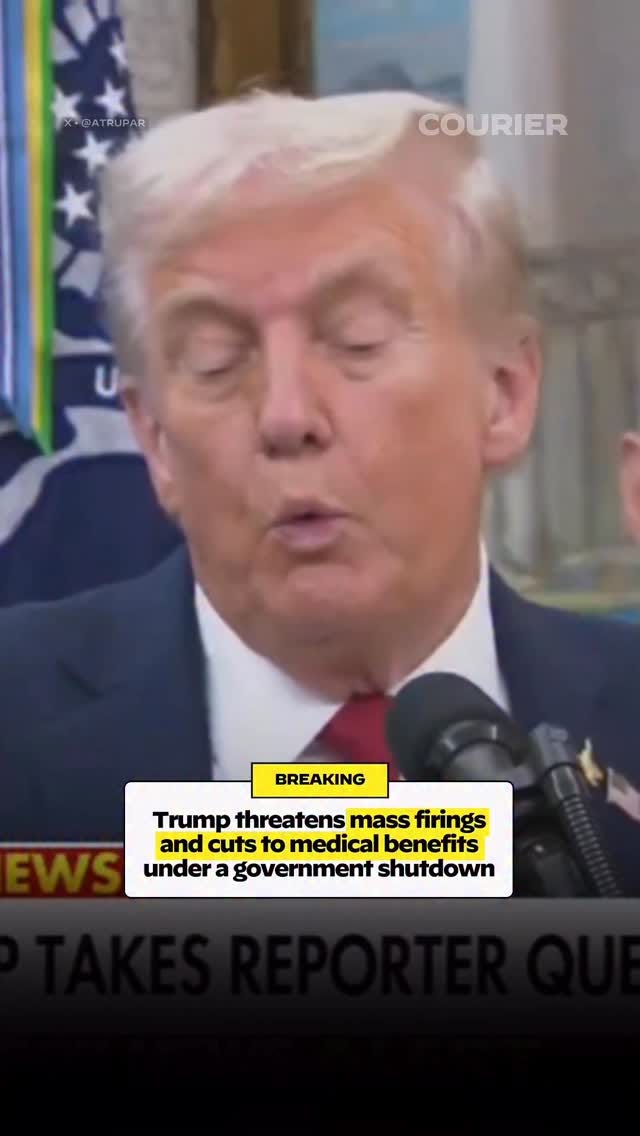The Man Who Wants Trump as King
Russell Vought is methodically building an all-powerful presidency, dismantling checks and balances under the guise of fiscal responsibility.
Setting the Stage
The New York Times reports that Russell Vought, Trump’s budget director, is no longer just managing numbers—he is orchestrating a power shift that could rewrite the balance between Congress and the presidency. His maneuvers go far beyond budgets: blocking foreign aid, gutting regulatory agencies, and openly testing whether the president can unilaterally cancel congressionally approved spending. While Elon Musk briefly hijacked headlines with his Department of Government Efficiency chaos, it’s Vought’s meticulous planning that is reshaping the machinery of government.
He has already presided over the death of the Corporation for Public Broadcasting, deep cuts to Medicaid and food stamps, and 245 deregulatory actions in a single year. Now, with a potential government shutdown looming, Vought is leveraging the crisis to purge federal employees and engineer legal battles that could end Congress’s control of the purse. Lawmakers like Senator Susan Collins have called his actions illegal, but so far Congress has done little to stop him.
The Power at Play
What Vought is attempting is not just fiscal conservatism; it is the deliberate concentration of executive power, eroding the separation of powers that has defined American governance since Watergate. They start by engineering dysfunction, then call it proof that government doesn’t work. By ordering agencies to prepare mass layoffs, Vought isn’t just attempting to saving money. He’s stripping them of the ability to function. And once they stumble, he’ll be there to point and say: look, bloated bureaucracies can’t get anything right.
It’s a loop. Starve agencies, watch them falter, then cite their weakness as justification for further cuts. Conservatives have been doing this for decades, but Vought is accelerating it into a constitutional crisis. He isn’t merely trimming budgets—he’s challenging Congress’s most basic role. If the Supreme Court accepts his “pocket rescissions,” a president could cancel spending on any program he dislikes, from Social Security to disaster relief. That’s not fiscal responsibility. That’s a power grab masquerading as thrift.
He sets up what Grover Norquist admiringly calls “lining up the billiard shots”—each deregulatory initiative, each spending freeze, each lawsuit designed to knock down one more limit on presidential authority.
Historically, presidents who tested these boundaries—Nixon with impoundments, Reagan with deregulation—were checked by courts and Congress. But Vought’s methodical approach, paired with a Supreme Court stacked in Trump’s favor, raises the stakes. If the Court sides with him on “pocket rescissions,” it could permanently strip Congress of its most fundamental power. That is not a policy tweak; it’s a structural transformation with very significant consequences.
Here is trump giving up the game:
A Lens of Justice
Cuts don’t land evenly. They rarely do. When Vought slashes Medicaid, it isn’t hedge fund managers who skip medical care. When food stamps shrink, it isn’t corporate lobbyists deciding between rent and groceries. The weight falls on single mothers, disabled children, working families already stretched thin.
This is how hierarchy operates in practice. Authoritarian systems thrive on convincing people that some lives are less worthy, some safety nets dispensable. Fascism, as scholars remind us, is built on a belief that society should be ruled by a narrow “us,” with everyone else subordinated. Vought is enacting that hierarchy with a budget ledger—transforming programs meant to equalize opportunity into evidence of weakness to be eliminated.
Reframing the Debate
The right’s branding of this agenda as “deconstructing the administrative state” is a masterclass in euphemism. It makes sabotage sound like renovation. Progressives need to puncture that framing. The real story isn’t waste or inefficiency. It’s deliberate sabotage: weakening the public’s institutions so they can be replaced by unaccountable power.
Instead of debating “big government versus small government,” the frame should be: who benefits when government fails? It isn’t families who lose healthcare. It isn’t students in underfunded schools. It’s corporations free to pollute, lenders free to prey, and presidents free to rule unchecked.
Building the Conversation
This can feel abstract until you anchor it in lived experience. When you’re talking with someone skeptical about “bureaucracy,” tell the story of Flint’s poisoned water. That wasn’t a failure of regulation—it was the absence of it. Or remind them of the seatbelt rules that cut highway deaths, or the disaster relief that keeps communities afloat after storms. These aren’t luxuries; they’re the difference between life and death.
Frame government not as an enemy but as our shared tool. When someone says “the government is broken,” don’t let that claim sit. Point out that it’s being broken on purpose, by people like Trump who profit from the wreckage.
The Counterpoint Trap
“Presidents need direct control over agencies to enforce the law.” → Hyper-Skepticism
This flips accountability on its head. Independent agencies protect against abuse; putting them under the president invites it.
Takeaway: Accountability means independence, not loyalty to one man.
“Government workers are lazy and corrupt, so firing them is good.” → Strawmanning
This caricature ignores the reality: federal workers are scientists, teachers, safety inspectors.
Takeaway: Public servants keep us safe; they’re not the enemy.
“Cutting aid to foreigners just keeps money at home.”→ Euphemistic Reframing
This frames nationalism as thrift. Aid stabilizes regions and prevents wars that cost far more.
Takeaway: Foreign aid is an investment in peace and security.
“Trump is just making government efficient, like a business.” → False Equivalence
A business exists to profit. A government exists to serve. Confusing the two erases the public good.
Takeaway: Efficiency is no substitute for democracy.
Deeper Dive
The Fifth Risk by Michael Lewis — a vivid look at how agencies quietly keep us safe, and what happens when they’re dismantled.
Democracy in Chains by Nancy MacLean — the long history of conservative efforts to undermine democracy.
The Authoritarian Playbook by Protect Democracy — practical warning signs of creeping authoritarianism.
How Democracies Die by Levitsky and Ziblatt — why rule-of-law erosion leads to authoritarian consolidation.
The Last Laugh
Russell Vought calls it responsibility, but responsibility doesn’t mean burning the house down and then insisting it was already a firetrap. Dictatorships are efficient too. And if efficiency is all we ask of government, democracy will not survive the audit.




